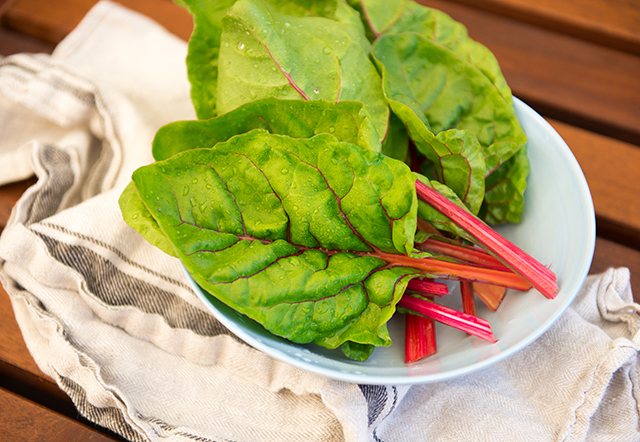
Advertisement
If you’re looking for a new leafy green to add to your daily routine, try Swiss chard. This leafy vegetable belongs to the amaranth family (Amaranthaceae) and is actually a variety of beets. However, beets are normally cultivated for their roots, whereas Swiss chard is usually grown for its large, crisp veined leaves.
Despite its name, Swiss chard isn’t native to Switzerland. Instead, this leafy vegetable got its name after a Swiss botanist “discovered” it in the 1700s. Swiss chard is actually native to the Mediterranean region, where it remains a very popular vegetable. Today, Swiss chard is also known as spinach beet or silverbeet.
Here’s why you should incorporate Swiss chard into your diet:
1. It provides essential nutrients.
Swiss chard is a nutrient powerhouse. It’s packed with several essential vitamins and minerals, as well as potent antioxidants. Here’s what one cup of raw Swiss chard contains:
- Vitamin K: 249 percent of the Daily Value (DV)
- Vitamin A: 12 percent of the DV
- Vitamin C: 12 percent of the DV
- Iron: 4 percent of the DV
- Copper: 7 percent of the DV
- Magnesium: 7 percent of the DV
- Manganese: 6 percent of the DV
2. It reduces inflammation.
Potent antioxidants in Swiss chard, such as vitamins A and C, reduce inflammation, especially the chronic type. When you have chronic inflammation, your body’s inflammatory response can eventually damage healthy cells, tissues and organs. Over time, this can lead to DNA damage and tissue death, which are linked to the development of several chronic diseases, including cancer.
3. It lowers blood pressure levels.
Swiss chard contains calcium, magnesium and potassium, three minerals that lower blood pressure by relaxing and widening the arteries. Studies have shown that people whose diets are low in these minerals are more likely to have high blood pressure.
4. It can help prevent cancer.
Eating Swiss chard may help lower your risk of cancer. That’s because Swiss chard contains a number of potent cancer-fighting compounds, such as quercetin, beta-carotene and betalains. In one study, researchers found that Swiss chard extract prevented human cancer cells from proliferating.
5. It controls blood sugar.
Swiss chard contains a compound called alpha-lipoic acid (ALA), which has been shown to improve blood sugar control. It also improves insulin resistance. This occurs when cells don’t respond well to insulin, the hormone that controls blood sugar levels.
6. It helps maintain strong bones.
Swiss chard is rich in vitamin K, which helps your body absorb calcium. In addition, Swiss chard contains modest amounts of calcium, which is primarily stored in your bones. These two nutrients help reduce your risk of fractures, especially in old age.
7. It maintains good vision.
If you want to keep your eyesight at its best even in later life, eat Swiss chard. This vegetable is a good source of lutein and zeaxanthin, two antioxidants that are particularly vital for eye health. They help protect your eyes from several age-related eye disorders, such as glaucoma, cataracts, macular degeneration and night blindness.
8. It supports nerve and muscle function.
Swiss chard contains several key minerals that ensure your nerves and muscles are functioning properly. These include potassium, magnesium and calcium, to name a few. Potassium helps your muscles contract and ensures that your heart is beating steadily.
Magnesium, on the other hand, helps muscles relax after contracting. It also helps nerves send and receive messages. Likewise, nerves need calcium to relay messages between the brain and the rest of the body.
Recipe for sauteed Swiss chard
Like other leafy greens, Swiss chard can be added to a variety of dishes, including soups and stews. You can use it in place of spinach as well.
Here’s a simple recipe for sauteed Swiss chard, which you can serve as a tasty side dish.
Ingredients:
- 3 garlic cloves, finely chopped
- 2 bunches of Swiss chard
- 1 onion, diced
- 2 tablespoons water
- 2 tablespoons extra-virgin olive oil
- 2 teaspoons balsamic vinegar (optional)
- 1/2 teaspoon salt
- 1 pinch dried thyme
- 1 pinch nutmeg
- Ground black pepper
Preparation:
- Stack several pieces of Swiss chard on a cutting board. Slice off the stems and set them aside.
- Cut the leaves into two-inch squares. Rinse and drain.
- Rinse the Swiss chad stems, then chop them to about the same size as the diced onion.
- Heat the extra-virgin olive oil in a skillet over medium-high heat and add the Swiss chard stems, garlic, onion, salt, thyme, nutmeg and black pepper (to taste). Cook for 6–8 minutes or until the onion lightly browns.
- Add the water and chopped Swiss chard leaves and cover. Cook for 2–4 minutes or until the leaves wilt. Remove the lid and continue cooking for 3 minutes or until the leaves have completely wilted and softened. Stir occasionally.
- Remove from heat and drizzle with balsamic vinegar, if using. Serve hot.
Swiss chard is a nutrient powerhouse linked to a number of health benefits, including strong bones and a lower risk of cancer. Incorporate Swiss chard into your diet to reap this leafy green’s nutritional benefits.
Sources:
Advertisements







